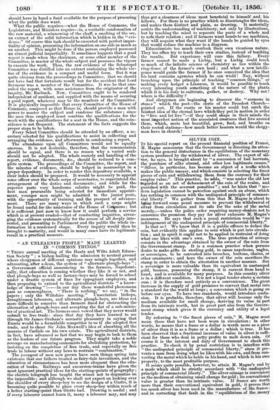" AN UNLEARNED PEOPLE" MADE LEARNED IN. " COMMON THINGS."
" THIRD annual meeting of the Hants and Wilts Adult Educa- tion Society" ; a bishop -hailing the admission to neutral ground where clergymen of different opinions may mingle together, and advocating, after a dean, the system of " alternate plough-boys " ; a Government official announcing to the farmers, Napoleoni- cally, that education is coming whether they like it or not, and. that plough-boys as well as factory-boys may be forced to school under a drastic system of fines for oppugnant employers, and then proposing. to extend to the agricultural districts a know- ledge of drawing " I—In our day these wonderful phenomena pass as commonplaces. " There is nothing," we say, " in the papers ; only the Wiltshire meeting." tInseetarian bishops, draughtsmen labourers, and alternate plough-boys, are ideas not more difficult to conceive than farmers fined for Obstructing the. alternation of plough-boys and accepting the fiat of a sub-minis- ter of practical art. The farmers once vowed that they never would submit to free trade : since that day they have learned to see through Sir James Graham's sarcastic pleasantry in saying that Russia would be a formidable competitor to us if she adopted free trade, and to cheer Sir John Maxwell's idea of absorbing all the manure of Carlisle on his Own estate. The agricultural districts, in fact, have advanced so fast that we may begin to look to them as the leaders of our future progress. They might take a noble revenge on manufacturing economists for abolishing protection, by insisting on the completion of: free trade and especially on free trade in labour without any laws to restrain "combination." The youngest of men now grown have seen things spring into existence that our fathers treated as fairy-tale inventions, and the education of circumstances has been more eloquent than the edu- cation of books. Railways and excursion-trains have given the most ignorant practical ideas for the starting-points of geography ; the electric telegraph has taught the wisest not to dogmatize on the impossible ; and although we shall not expect on looking over the shoulder of every sheep-boy to see the design of a Giotto, it is becoming quite possible to place every sheep-boy within reach of a better starting-point than Giotto had. Drawing is useful ; and if every labourer cannot learn it, many a labourer may, and may
thus get a clearness of ideas most beneficial to himself and his fellows. For there is no practice which so disentangles the ideas, and makes them distinct and plain, as drawing. It materially assists the understanding of machinery, not only by illustrations, but by teaching the mind to separate the parts of a whole and to note their relation ; and if farmers want hands to use machines, they will acquire what they want if the hands be guided by eyes that would reduce the machine to a diagram.
Educationists too much overlook their own vicarious nature.
They too often try to teach their ownstudies instead of teaching results. But experience will cure this fallacy. Every farmer cannot be made a Liebig, but a Liebig could tench so much of the infinite science of chemistry as hes within the ring-fence of the farmer's own land ; and what a new intelli- gence would guide the farmer if he once conceived the idea that his land contains agencies which he can wield ! Nay, without trenching upon the principle of teaching "common things," or making every hedger a Linnaeus, it would be possible to teach every labouring -youth something of the nature "of. the plants which it is his duty to cultivate, gather, or destroy. Why not? where is the difficulty ?
And clergymen are beginning to discover the " sermons in stones" -which the poet—the cleric of the Broadest Church— pointed out. If the rustic or his master could but catch the faintest idea of the eternal laws which they put in motion in order to " live and let live "—if they could shape in their minds the most imperfect notion of the associated creatures that live around them, which, mute but beautiful, grow, feed, and breathe on their rooted stations—how much better hearers would the clergy- man have in church!


























 Previous page
Previous page